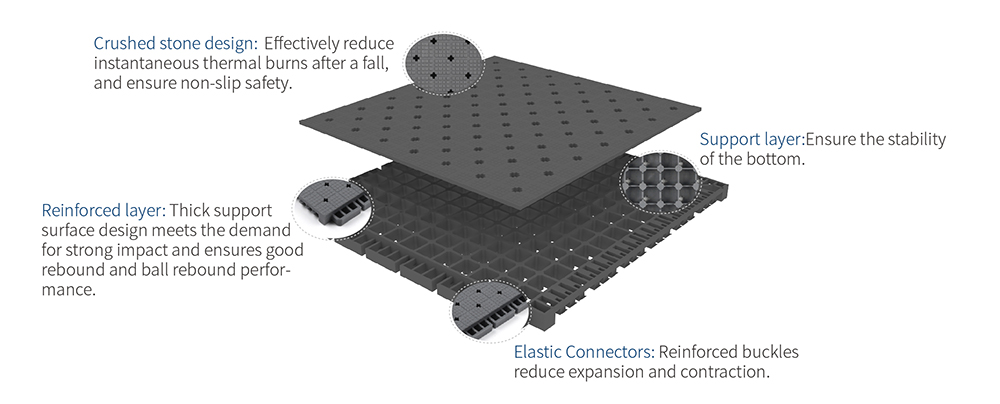Dec . 04, 2024 10:45 Back to list
Choosing the Best Flooring for Your Commercial Kitchen Needs and Durability
Choosing the Right Flooring for Your Commercial Kitchen
In the fast-paced environment of a commercial kitchen, functionality, safety, and maintenance are crucial considerations when it comes to flooring. The right flooring can withstand high foot traffic, resist spills and stains, and provide a safe working environment for kitchen staff. Various flooring options are available, each with distinct advantages and potential drawbacks. This article will explore different types of commercial kitchen flooring, their benefits, and important factors to consider when making your choice.
Types of Flooring
1. Vinyl Flooring Vinyl is a popular choice for commercial kitchens due to its versatility, affordability, and ease of maintenance. Vinyl flooring is available in a range of styles and colors, allowing for seamless integration into any kitchen design. It is also water-resistant, making it suitable for areas prone to spills. However, while vinyl can be durable, it is essential to choose a high-quality commercial-grade vinyl to ensure it withstands the rigors of a busy kitchen.
2. Rubber Flooring Rubber flooring is an excellent choice for commercial kitchens, offering durability and slip resistance. It provides a cushioned surface that can reduce fatigue for staff who spend long hours on their feet. Rubber flooring is also easy to clean and can withstand temperature fluctuations and spills. Available in tiles or rolls, rubber is also available in various colors, enabling customization to match the kitchen's design.
3. Tile Flooring Ceramic or porcelain tiles are another durable option for commercial kitchens. Tiles are resistant to heat and moisture, making them suitable for various kitchen environments. These materials are also easy to clean and maintain, although grout lines can be a challenge as they may harbor dirt and grime if not properly maintained. Slip-resistant tiles can enhance safety in busy kitchen areas.
4. Concrete Flooring Concrete flooring is a robust and highly durable option for commercial kitchens. When finished with a sealant, concrete can resist stains and spills and can be treated with anti-slip coatings for safety. Although it may require more initial investment for installation and finishing, concrete is long-lasting and can be customized with colors and textures, making it suitable for any kitchen aesthetic.
5. Epoxy Flooring Epoxy flooring has gained popularity in commercial kitchens due to its seamless finish, which provides excellent protection against spills and stains. It is durable, resistant to chemicals, and can be applied over existing floors, reducing installation time and costs. With its smooth surface, epoxy flooring minimizes the risk of bacterial growth, making it a sanitary choice. However, skilled application is crucial for optimal performance.
Key Considerations
commercial kitchen flooring

When choosing flooring for a commercial kitchen, several factors should be taken into account
- Safety Slip resistance is paramount in kitchen environments, where spills can occur frequently. Select flooring that meets safety standards to reduce the risk of accidents.
- Durability The high foot traffic in commercial kitchens requires flooring that can withstand wear and tear. Look for materials that are designed for commercial use and can endure heavy loads and impacts.
- Maintenance Ease of cleaning should be a top priority. Consider how often the flooring will need to be cleaned and if the material can be effectively maintained to uphold hygiene standards.
- Cost Budget is always a consideration when investing in flooring. While some materials may have higher upfront costs, their longevity and reduced maintenance needs could offer better value over time.
- Aesthetics Although functionality is critical, the aesthetic appeal of the flooring shouldn’t be overlooked. The right flooring can enhance the overall design of the kitchen and contribute to a positive working environment.
Conclusion
Choosing the right flooring for a commercial kitchen is an essential decision that impacts functionality, safety, and maintenance. With various options available, it is crucial to evaluate each material's properties and align them with the specific needs of your kitchen environment. By prioritizing durability, safety, and ease of maintenance, you can create a safe and efficient workspace that meets the demands of a bustling kitchen operation. Whether you lean towards vinyl, rubber, tile, concrete, or epoxy flooring, investing in quality materials will pay off in the long run, ensuring that your commercial kitchen operates smoothly and safely for years to come.
-
Premium Basketball Board Stand with GPT-4-Turbo AI
NewsJul.31,2025
-
Premium Maple Flooring for Gyms & Homes | PVC & Vinyl Options
NewsJul.30,2025
-
Premium Outdoor Basketball Court Tiles for All Weather Use
NewsJul.30,2025
-
Durable Basketball Board Stand for Indoor & Outdoor Use
NewsJul.29,2025
-
Durable Pickleball Court Tiles for Outdoor Sport Courts
NewsJul.29,2025
-
Premium PVC Vinyl Flooring for Homes & Gyms – Eco & WPC Options
NewsJul.29,2025

